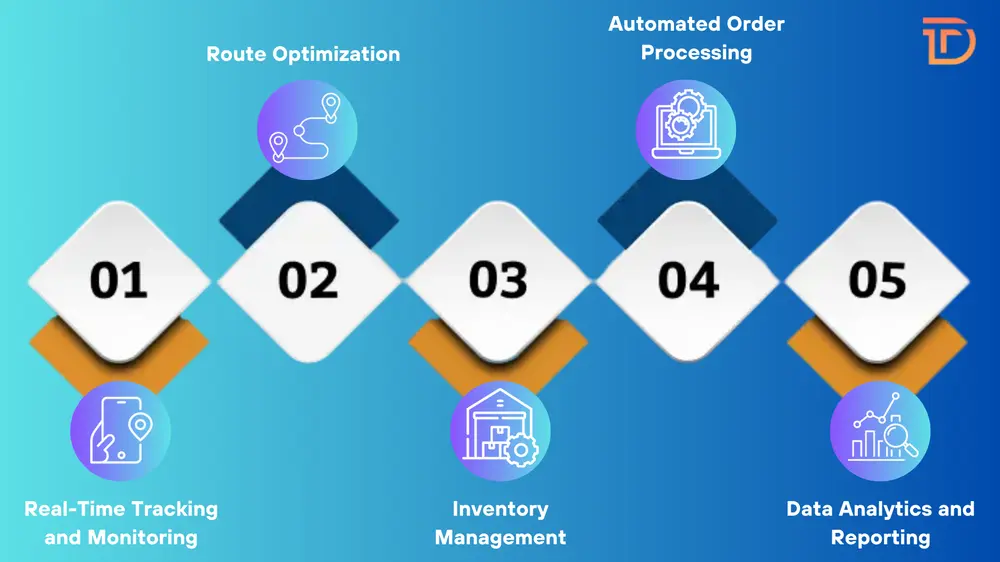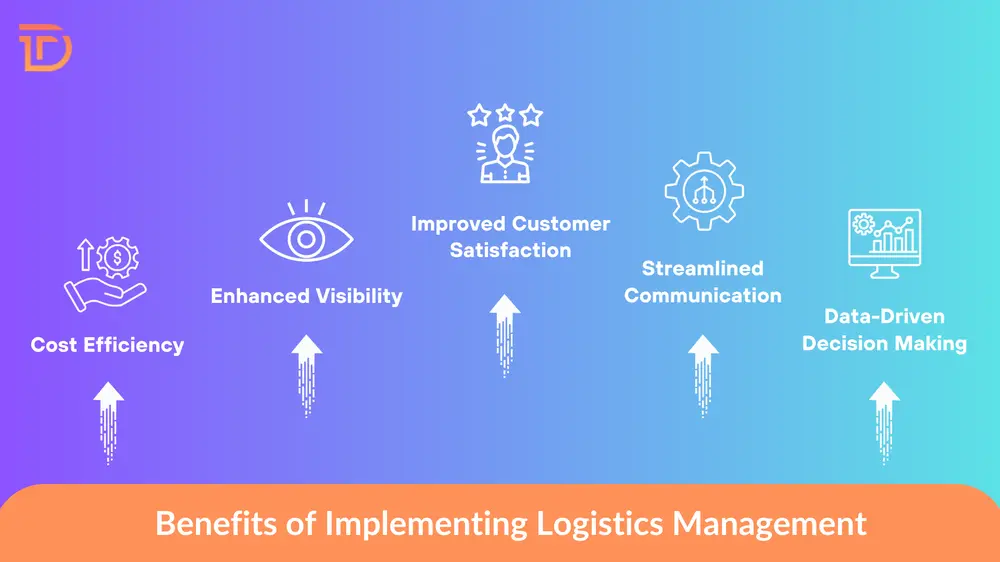The supply chain landscape has witnessed a massive transformation in recent years, primarily driven by technological advancements. One of the most significant developments in this space has been the introduction of logistics management software (LMS). As supply chains become increasingly global, businesses face heightened pressures to deliver products quickly, and cost-effectively. Logistics management plays a critical role in helping companies streamline their operations, manage resources more effectively, and enhance customer satisfaction. From route optimization to real-time tracking, the software is reshaping how businesses approach logistics and supply chain management. In this blog, we will explore the various ways LMS is revolutionizing supply chain operations. It will cover what software is, its key features, the benefits of its implementation, and how businesses can successfully integrate it into their operations with the help of logistics management software development.
What is Logistics Management Software?
Logistics management software is a comprehensive solution designed to manage and optimize the flow of goods and services across the supply chain. The primary goal of this software is to help businesses manage the complex logistics of transporting goods from one point to another, tracking inventory, optimizing warehouse operations, and ensuring timely delivery.
At its core, the software integrates several functions, including transportation management, inventory management, order fulfillment, and tracking. Additionally, it serves as a central hub where businesses can monitor all logistics operations in real time, providing better visibility into performance, inventory levels, and delivery times. This level of transparency is vital for maintaining smooth operations and keeping costs in check.
For companies involved in manufacturing, wholesale distribution, e-commerce, or retail, logistics software provides essential tools that automate and optimize day-to-day processes. Also, by eliminating manual workflows and providing real-time data, it allows businesses to respond more effectively to disruptions, changes in demand, or any logistical challenges that arise.
Key Features of Logistics Management Software
Logistics management software is equipped with a variety of features that address the complexities of modern supply chains. Moreover, these features are designed to automate and streamline the entire process, making it more efficient, cost-effective, and responsive. Some of the most critical features include:

Real-Time Tracking and Monitoring
One of the standout features of logistics management software is real-time tracking. With the ability to track shipments and vehicles at any given moment, businesses gain visibility into every part of the supply chain. Real-time tracking allows companies to monitor the movement of goods, ensuring that products are delivered on time and in optimal condition. This feature also helps in identifying any disruptions or delays early on, enabling businesses to take corrective actions immediately.
Route Optimization
Route optimization is another powerful feature offered by logistics software. Logistics management software uses algorithms to analyze real-time data about traffic, weather conditions, road closures, and delivery schedules. This data is then used to recommend the most efficient routes for transportation, which helps in reducing fuel consumption, minimizing delays, and lowering transportation costs. For businesses managing large fleets, this feature is invaluable in optimizing deliveries and improving operational efficiency.
Inventory Management
Logistics management software also integrates inventory management tools that allow businesses to track stock levels in real-time. This ensures that inventory is aligned with demand and helps prevent stockouts or overstocking issues. Inventory management features also enable businesses to track the movement of goods through warehouses and storage facilities, ensuring that they are in the right place at the right time. This level of control enhances inventory turnover and helps businesses avoid tying up capital in excess stock.
Automated Order Processing
Automated order processing is a feature that accelerates the fulfillment cycle by automatically processing orders from customers. This reduces the likelihood of human error and ensures that orders are fulfilled faster and more accurately. Logistics management software also provides insights into order statuses, helping businesses improve order visibility and meet customer expectations more effectively.
Data Analytics and Reporting
Data analytics is a vital component of logistics management software, offering businesses detailed insights into their supply chain performance. These insights help businesses identify inefficiencies, forecast demand more accurately, and make data-driven decisions that can lead to cost savings and improved operations. Additionally, the software can generate a wide range of reports, from performance metrics to financial analyses, enabling businesses to continuously improve their logistics strategies.
Benefits of Implementing Logistics Management Software
The implementation of logistics management software offers numerous benefits for businesses across various industries. Logistics software can transform the operations of companies involved in transportation, manufacturing, or retail. Here are the key advantages of implementing LMS:

Cost Efficiency
One of the most significant advantages of logistics management software is the potential for cost savings. Through route optimization, automated processes, and better inventory control, businesses can reduce operational costs. For example, route optimization minimizes fuel consumption and driver hours, leading to lower transportation costs. Moreover, automated order processing reduces labor costs and improves accuracy, reducing the chances of costly errors.
Additionally, inventory management features ensure that businesses don’t overstock or understock products, leading to more efficient use of capital and fewer storage costs. The ability to optimize every aspect of the supply chain ultimately helps businesses operate more cost-effectively.
Enhanced Visibility
Logistics management software provides businesses with real-time visibility into their supply chain operations. This enhanced visibility enables businesses to track goods from the moment they leave the warehouse until they reach the customer. This transparency allows companies to identify potential disruptions in the supply chain early, such as delays or damaged goods, and take corrective action promptly.
Improved visibility also facilitates better communication across departments, such as sales, warehouse management, and customer service. Real-time access to data ensures that all team members are on the same page, reducing errors and delays caused by miscommunication.
Improved Customer Satisfaction
In the competitive market, customer satisfaction is paramount. Logistics management software plays a crucial role in ensuring timely deliveries and accurate order fulfillment. With better inventory control and real-time tracking, businesses can deliver products on time and keep customers informed about their order statuses.
When you keep customers in the loop and deliver their products on time, they are more likely to become repeat customers. Furthermore, efficient logistics operations reduce the chances of customer complaints, returns, and lost sales, all of which can negatively impact a business’s reputation.
Streamlined Communication
Effective communication is crucial in supply chain management, and LMS helps streamline this process. Also, by providing a centralized platform for all logistics-related activities, the software ensures that suppliers, distributors, and customers can easily communicate and collaborate.
This reduces the chances of misunderstandings and miscommunication, which can lead to delays, errors, or disruptions in the supply chain. Additionally, logistics software often includes features such as notifications and alerts, keeping all stakeholders updated on the status of shipments, deliveries, and inventory.
Data-Driven Decision Making
Logistics management software provides access to comprehensive data that businesses can use to make informed decisions. By analyzing key performance indicators (KPIs), such as delivery times, shipping costs, and inventory levels, businesses can identify trends, weaknesses, and opportunities for improvement.
These insights empower decision-makers to make data-driven adjustments to their logistics strategies, whether it’s optimizing delivery routes, re-negotiating supplier contracts, or adjusting inventory levels to better match demand. The result is a more agile and responsive supply chain that can adapt to changing market conditions.
How to Implement Logistics Management Software?
Implementing LMS is a significant investment, and businesses need to approach the process carefully to ensure success. The implementation process of custom logistics management software involves a personalized platform built by a software development company that can streamline your logistics operations to meet your business’s specific needs. The process starts by collaborating with the development company to identify your business requirements, such as inventory management, order processing, route optimization, and integration with other systems like ERP or CRM. By working closely with experts, you ensure that the software will address your unique challenges effectively.
Once the requirements are defined, the logistics software development company will design and build a custom solution, incorporating the necessary features like real-time tracking and automated workflows. The development process includes extensive testing to ensure reliability, scalability, and seamless functionality.
After development, the next step is to implement the software into your existing processes. The custom software development company will assist in integrating the logistics software with your current systems, such as warehouse management and financial tools, ensuring smooth data flow. They will also provide training to your team, ensuring that everyone from warehouse staff to customer support understands how to use the new system.
With the software live, continuous monitoring and optimization are key to improving efficiency. Regular updates and feedback loops will ensure that the solution evolves alongside your business needs. Moreover, by working with a custom software development company, you can successfully integrate tailored logistics management software into your existing processes, improving your operational efficiency and enhancing customer satisfaction.
Wrapping Up
Logistics management software is a necessity for businesses aiming to remain competitive in the fast-paced world of supply chain management. It offers a wide range of benefits, from reducing costs and improving visibility to enhancing customer satisfaction and enabling data-driven decision-making. Furthermore, the software helps streamline processes, eliminate inefficiencies, and scale operations, making it an essential tool for businesses of all sizes.
Implementing LMS can be a complex process, but with careful planning, the right software choice, and effective training, businesses can reap the full benefits of this transformative technology. Dreamer Technoland offers custom logistics software development services that streamline operations and boosts efficiency. As the logistics landscape continues to evolve, investing in our custom software development services will be critical for businesses looking to stay ahead of the curve, optimize their fleet operations, and deliver exceptional service in an increasingly competitive market.



